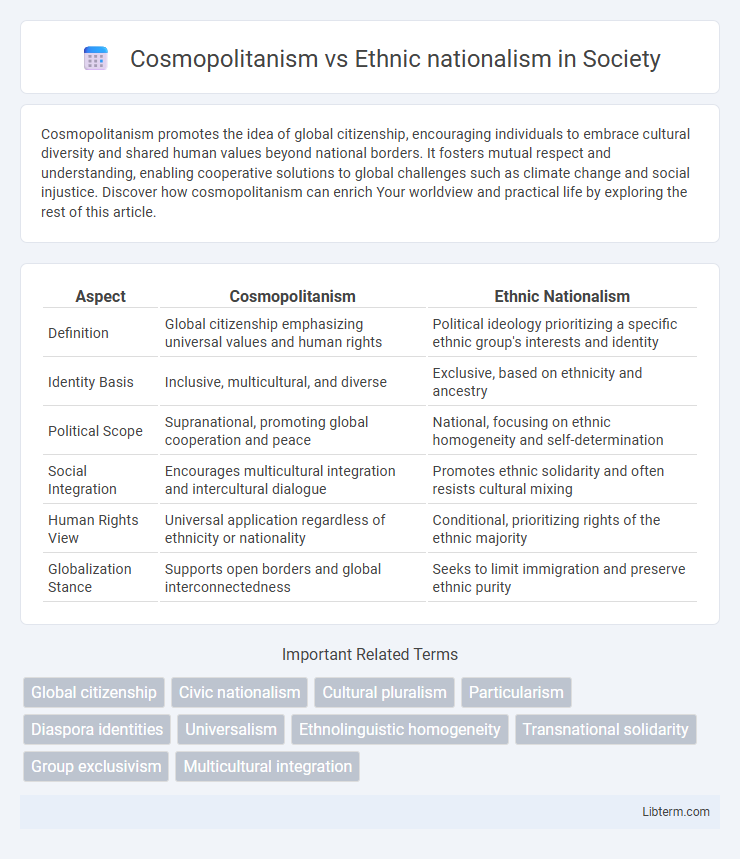Cosmopolitanism promotes the idea of global citizenship, encouraging individuals to embrace cultural diversity and shared human values beyond national borders. It fosters mutual respect and understanding, enabling cooperative solutions to global challenges such as climate change and social injustice. Discover how cosmopolitanism can enrich Your worldview and practical life by exploring the rest of this article.
Table of Comparison
| Aspect | Cosmopolitanism | Ethnic Nationalism |
|---|---|---|
| Definition | Global citizenship emphasizing universal values and human rights | Political ideology prioritizing a specific ethnic group's interests and identity |
| Identity Basis | Inclusive, multicultural, and diverse | Exclusive, based on ethnicity and ancestry |
| Political Scope | Supranational, promoting global cooperation and peace | National, focusing on ethnic homogeneity and self-determination |
| Social Integration | Encourages multicultural integration and intercultural dialogue | Promotes ethnic solidarity and often resists cultural mixing |
| Human Rights View | Universal application regardless of ethnicity or nationality | Conditional, prioritizing rights of the ethnic majority |
| Globalization Stance | Supports open borders and global interconnectedness | Seeks to limit immigration and preserve ethnic purity |
Defining Cosmopolitanism and Ethnic Nationalism
Cosmopolitanism is defined as the ideology that all human beings belong to a single community based on shared morality, emphasizing global citizenship and universal values beyond national or ethnic boundaries. Ethnic nationalism prioritizes the interests, culture, and identity of a specific ethnic group, promoting political sovereignty and social cohesion rooted in common ancestry, language, and traditions. These contrasting frameworks shape debates on identity, belonging, and political organization in an increasingly interconnected world.
Historical Development of Both Ideologies
The historical development of cosmopolitanism stems from the ancient Stoics who promoted the idea of a world citizenship transcending local identities, evolving through Enlightenment thinkers advocating universal human rights and global justice. Ethnic nationalism emerged prominently in the 19th century during European nation-state formation, emphasizing shared heritage, language, and culture as the basis for political identity and sovereignty. These ideologies diverged as cosmopolitanism prioritized inclusiveness and global cooperation, while ethnic nationalism centered on distinct group identity and territorial exclusivity.
Core Philosophical Differences
Cosmopolitanism emphasizes global citizenship and moral obligations that transcend national or ethnic boundaries, advocating for universal human rights and inclusive identity formation. Ethnic nationalism centers on the preservation and promotion of a distinct ethnic group's culture, heritage, and political sovereignty, prioritizing collective identity based on shared ancestry and historical continuity. These core philosophical differences reflect competing views on the scope of political loyalty and the basis of social solidarity, contrasting universalism with particularism.
Social Identity and Belonging
Social identity in cosmopolitanism emphasizes global citizenship and shared human values, fostering a sense of belonging beyond national or ethnic boundaries. Ethnic nationalism centers social identity on common heritage, language, and ancestry, reinforcing in-group loyalty and cultural distinctiveness. Belonging in cosmopolitanism is inclusive and fluid, while ethnic nationalism creates exclusive bonds rooted in historical and ethnic continuity.
Political Implications and Governance
Cosmopolitanism advocates for inclusive governance structures that transcend ethnic boundaries, promoting global citizenship and universal human rights, which can enhance cooperation in multinational institutions. Ethnic nationalism emphasizes governance based on shared ethnicity, often leading to policies prioritizing the interests of a dominant ethnic group, potentially causing exclusion and social fragmentation. The political implications include tensions between supranational integration and the assertion of ethnic identity, influencing state sovereignty, minority rights, and the stability of multicultural societies.
Impact on Multicultural Societies
Cosmopolitanism fosters inclusive multicultural societies by promoting global citizenship, cultural exchange, and mutual respect among diverse ethnic groups. Ethnic nationalism often prioritizes the interests of a specific cultural or ethnic group, leading to social fragmentation, exclusion, and potential conflict within diverse populations. The impact on multicultural societies is significant: cosmopolitanism encourages social cohesion and integration, while ethnic nationalism can amplify divisions and hinder harmonious coexistence.
Globalization and Cultural Integration
Cosmopolitanism promotes global citizenship and cultural integration by embracing diversity and fostering cross-cultural dialogue, which aligns with globalization's expansion of interconnected markets and communication networks. Ethnic nationalism emphasizes preserving distinct cultural identities and prioritizes the interests of specific ethnic groups, often resisting homogenizing effects of globalization. The tension between these ideologies shapes debates about cultural sovereignty, migration policies, and the balance between global integration and local identity preservation.
Challenges and Criticisms of Cosmopolitanism
Cosmopolitanism faces challenges such as critiques of its perceived detachment from local identities and traditions, which ethnic nationalism emphasizes as essential to social cohesion. Critics argue that cosmopolitan ideals often overlook power imbalances and cultural differences, leading to a homogenized global culture that undermines ethnic diversity. The difficulty in reconciling universal moral commitments with particularistic ethnic loyalties creates tensions that question the practical viability of cosmopolitanism in diverse societies.
Rise of Ethnic Nationalism in Modern Politics
The rise of ethnic nationalism in modern politics challenges the principles of cosmopolitanism by emphasizing loyalty to shared heritage, language, and cultural identity over global citizenship. Ethnic nationalist movements have gained momentum due to perceived threats to national sovereignty, economic disparities, and migration pressures, leading to increased political polarization in Europe, Asia, and North America. Governments adopting ethnic nationalist rhetoric often prioritize exclusionary policies that undermine multicultural integration and international cooperation.
Pathways Toward Reconciliation and Coexistence
Pathways toward reconciliation between cosmopolitanism and ethnic nationalism emphasize inclusive dialogue and mutual recognition of diverse identities to foster coexistence. Strategies include promoting multicultural education, establishing shared political institutions that respect ethnic autonomy, and encouraging intercultural exchange programs to build trust and understanding. These approaches aim to balance universal human rights with the preservation of ethnic heritage, facilitating peaceful coexistence and social cohesion.
Cosmopolitanism Infographic

 libterm.com
libterm.com